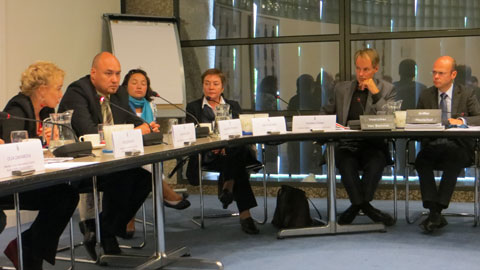Human Rights Defenders Discuss Violations of Human Rights in Belarus with Dutch Officials
The International Federation for Human Rights (FIDH) and the Netherlands Helsinki Committee (NHC) invited a delegation of Belarusian and Russian human rights defenders to raise issues regarding the systematic violation of human rights in Belarus with Dutch officials.
Over the course of the three-day visit, Valentin Stefanovich, Vice President of Human Rights Center “Viasna”, Zhanna Litvina, chairperson of the Belarusian Association of Journalists (BAJ), and the Russian human rights defenders Olga Zakharova and Yuri Dzhibladze from the Committee on International Control over the Human Rights Situation in Belarus all visited the Hague and Amsterdam, where they held a series of meetings at the Ministry of Foreign Affairs and the Dutch Parliament and met with representatives of international and Dutch NGOs.
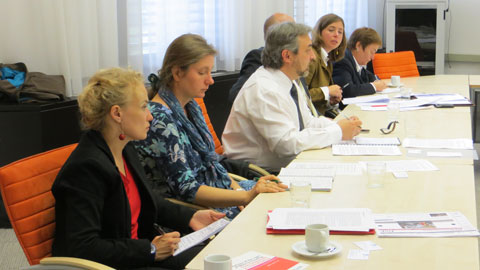
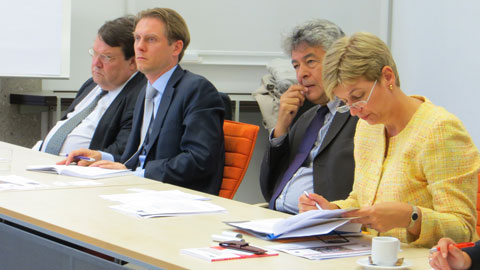
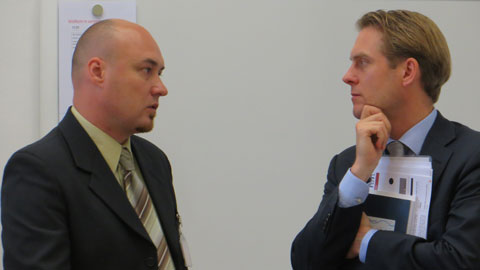
At the Ministry of Foreign Affairs, the delegation was met by Daphne Bergsma, head of the European Department; Lionel Veer, the Dutch human rights ambassador; Dirk Jan Kop, Special Representative of the Dutch Foreign Ministry on the Eastern Partnership; and officials from the departments for international policies and economic ties.
On September 12, hearings were held in Parliament on the topic of “Belarus: Business and Human Rights.” According to Hans van Bommel, a deputy in the Dutch Parliament and organizer of the hearings, Dutch companies are the main importers of products from Belarus behind Russian companies and therefore must be educated about the gross violations that are taking place in Belarus.
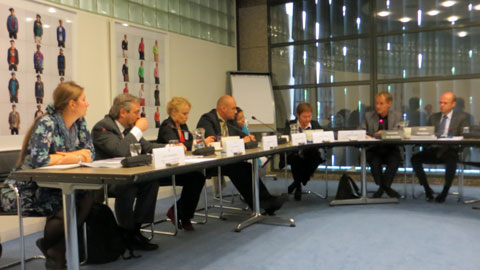
Valentin Stefanovich spoke about violations in the spheres of political and civil rights, placing special emphasis on the situation of political prisoners. He also spoke about how Dashkevich and Frantskevich, who were recently released from prison, were forced to serve out their sentences to the end, and that Dashkevich’s sentence was even extended while he was in prison.
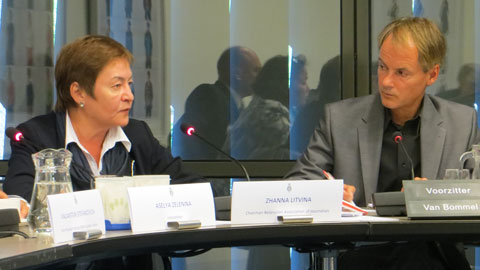
Zhanna Litvina outlined the problems independent journalists and the mass media in general face, noting that journalists are regularly detained while performing their professional obligations and that their access to information is restricted. She stressed that Belarusian laws must be brought in line with international norms and standards and that the sphere of the media must be reformed with the help of international experts.
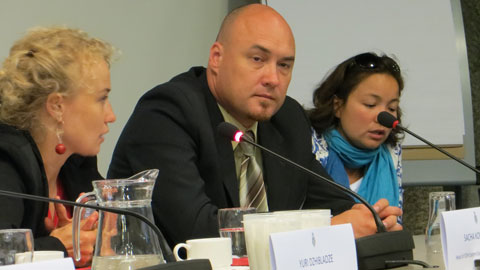
Sacha Koulaeva, head of the Eastern Europe and Central Asia Desk at FIDH, spoke about the results of a research mission to study work conditions and elements of forced labor in Belarus. This mission was conducted in conjunction with Viasna in a number of Belarusian cities throughout June 2013.
Yuri Dzhibladze and Olga Zakharova presented their research on Dutch investments in Belarus and noted that a condition for cooperating with the Belarusian regime should be improvement in the sphere of human rights.
Daphne Bergsma, head of the European Department, stated on behalf of the Dutch Ministry of Foreign Affairs that the Netherlands expresses its full support of civil society in Belarus and is convinced that a strong civil society is the key for positive changes in the country’s situation. She noted that the Netherlands has issued sharp criticisms of the situation with human rights in Belarus in international arenas and hopes that other European countries will take the same critical approach. Hans van Bommel, the parliamentary deputy, promised to raise the issues addressed during the hearings at parliamentary sessions.
Amnesty International in the Netherlands held a public meeting in Amsterdam for activists and employees of various NGOs and unions operating in Belarus. The organization affirmed its decision to continue a large-scale campaign to free Ales Bialiatski, head of Viasna and vice-president of FIDH, and to improve the overall situation with human rights in the country, including working towards the abolishment of the death penalty.



